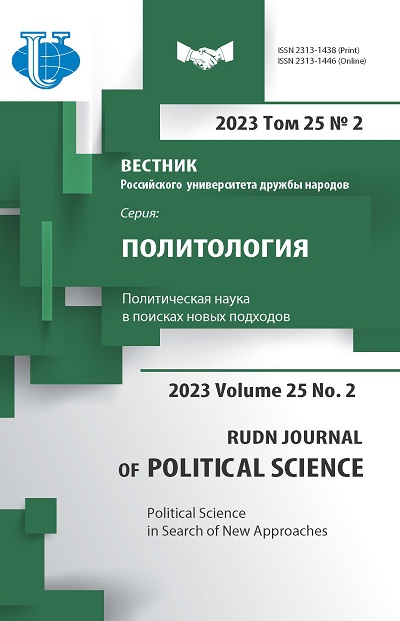Political Administration VS Political Competition Under Neo-Authoritarian Rule
- Авторлар: Nisnevich Y.A.1
-
Мекемелер:
- National Research University Higher School of Economics
- Шығарылым: Том 25, № 2 (2023): Political Science in Search of New Approaches
- Беттер: 397-422
- Бөлім: POLITICAL PHENOMENA AND STRATEGIES
- URL: https://journal-vniispk.ru/2313-1438/article/view/322233
- DOI: https://doi.org/10.22363/2313-1438-2023-25-2-397-422
- EDN: https://elibrary.ru/ONPDQM
- ID: 322233
Дәйексөз келтіру
Аннотация
The article discusses the replacement of political competition with political administration in order to maintain the power of the ruling political actors and ensure the tenure of the ruling regime under neo-authoritarian rule in a number of countries in Asia, Africa and Latin America. The administration of all key arenas of the political sphere is implemented through special political technologies and informal practices of political corruption. A pseudo-multiparty system with a dominating ruling party is being constructed in the party-political arena. In the media arena, the most influential mass media are being “nationalized”. In the arena of personnel, through political nepotism, adherents of the ruling regime are placed in key political and administrative positions of public power. In the electoral arena, the institution of elections is transformed into a procedure for the formation of public authorities by manipulating the voting procedures. In the legislative arena, the ruling party provides political administration of legislative and parliamentary activities in general. In the judicial arena, through the administrative regulation of the judiciary personnel, the judicial system is integrated into a single system of neo-authoritarian rule aimed at providing judicial protection for the ruling regime from the discontent of the citizens and using courts for political purposes. To demonstrate the appearance of democratic legitimacy, all neo-authoritarian regimes imitate the work of the basic institutions of democracy.
Авторлар туралы
Yuliy Nisnevich
National Research University Higher School of Economics
Хат алмасуға жауапты Автор.
Email: jnisnevich@hse.ru
ORCID iD: 0000-0001-9911-9623
Full Professor, Doctor of Political Science, Professor, Department of Politics and Governance
Moscow, Russian FederationӘдебиет тізімі
- Arbatskaya, M.N., & Xu, O.L. (2021). The system of rural local self-government in the “new normal” of China: stages of development and models of elections. Greater Eurasia: Development, security, cooperation, 4(1), 676-686.
- Baturo, A., & Elgie, R. (2019). The Politics of Presidential Term Limits. Oxford, United Kingdom; New York, NY: Oxford University Press.
- Bourdieu, P. (1993). Sociology of Politics. Socio-Logos. (In Russian)
- Carothers, T. (2002). The End of the Transition Paradigm. Journal of Democracy, 13(1), 5-21.
- Cheibub, J., Gandhi, J., & Vreeland, J. (2010). Democracy and Dictatorship Revisited Codebook. Public Choice, 143, 1-2, 67-101.
- Guriev, S., & Treisman, D. (2015). How Modern Dictators Survive: An Informational Theory of the New Authoritarianism. NBER Working Paper Series. Working Paper 21136. April 2015. National Bureau of Economic Research. Cambridge.
- Haynes, D. (2018). What Fearlessness Looks Like: Nicaragua’s Plunge into Crisis. The Progressive, 82(5), 51-53.
- Honduras: inertia on the path to change. Series of analytical publications “Summit”. (2015). Institute of Latin American Studies Russian Academy of Sciences. (In Russian)
- Krylov, A. (2007). African Horn: New Trends of Development. World Eсonomy and International Relations, (9), 91-96. https://doi.org/10.20542/0131-2227-2007-9-91-96 (In Russian)
- Kurtov, A. (2007). “The Khan’s Circle”: The System of Power in Central Asia. Prognosis, 1(9), 316-331. (In Russian)
- Levitsky, S., & Way, L.A. (2002). Elections Without Democracy: The Rise of Competitive Authoritarianism. Journal of Democracy, 13(2), 51-65.
- Malashenko, A. (2011). Doomed to Eternity and Stagnation. Pro et Contra, May-August, 78-100. (In Russian)
- Malysheva, D.B. (2018). Political Processes in the Republics of post-Soviet Central Asia. Outlines of Global Transformations: Politics, Economics, Law, 11(3), 36-52. https://doi.org/10.23932/2542-0240-2018-11-3-36-52 (In Russian)
- Nisnevich, Y. (2012). What is Democracy? Political Science Issues, 1(5), 29-40. (In Russian)
- Nisnevich, Y. (2021). Authoritariansm of the 21st Century: Analysis in the Institutional Purpose Paradigm. World Eсonomy and International Relations, 65(8), 109-119. https://doi.org/10.20542/0131-2227-2021-65-8-109-119 (In Russian)
- Nordlinger, J. (2019). Nicaragua in Hell. National Review, LXXI, 5, 24-25.
- Rossoshansky, A.V. (2011). Features of “black” information political technologies. Vlast, 5, 41-44. (In Russian)
- Sabo, R. (2012). Political Process in Nigeria After Thirty Years of Military Regimes. RUDN Journal of Political Science, (2), 53-69. (In Russian)
- Shabrov, O.F. (2012). Political Technologies. Knowledge. Understanding. Skill, 4, 328-330. (In Russian)
- Shilov, V.N., & Rylkina, A.H. (2011). Political Competition: The Term, the Concept, the Activity Form. Scientific statements of Belgorod State University. Series: History. Political science, 13(108), 19, 176-184. (In Russian)
- Solovyov, A.I. (2008). Political Science: Political Theory, Political Technologies. Aspect Press. (In Russian)
- Vartazarova, L., Kobrinskaya, I., & Utkin, S. (Eds.). (2019). Modern Turkey: Development Trends and the Meaning for Russia. Moscow, IMEMO. https://doi.org/10.20542/978-5-9535-0550-5 (In Russian)
- Zhiltsov, S., & Zonn, I. (2019). Political development of Kazakhstan: Results and prospects. Central Asia and the Caucasus, 22(4), 67-76. (In Russian)
Қосымша файлдар








